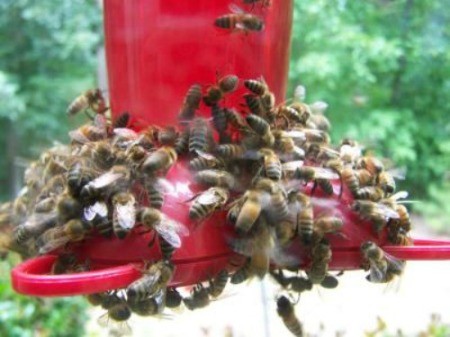
We have hummingbird feeders and its horrible to see the little hummingbirds trying to eat at the feeders with all the bees. No matter how many feeders I put out the bees are all over the feeders. I hope that someone can help. Thank you.
Jodi from Texas
Here are my ideas for keeping bees, wasps, and other stinging insects away from your hummingbird feeders.
First, keep in mind that it's never safe to use any chemicals to control insects at bird feeders. That's a given of course, but it needs to be stated anyway. Any flying insects (yes, even the wasps) that choose to feed on hummingbird nectar are likely to play an important role in pollination.
In the case of bees, swarming to the feeder for nectar is usually a transient problem. This isn't always the case with other stinging insects, but bees tend to flock to feeders only when other food supplies are low (e.g. few open flowers or lack of rain).
Many people have found that applying cooking oils and sprays to the outside of the feeder ports deters bees, wasps, and other insects. Be very careful if you do this. These tiny birds expend enormous amounts of energy. They need to feed constantly and have little margin for error when it comes to making a livelihood. Oil that accidentally gets on the hummingbird while feeding or during feeder fights can spell disaster when it comes time to preen their feathers. Birds produce their own oils for preening and additional oils can cause their feathers to become matted, which reduces their ability to fly and keep warm. If you decide to use oil on your feeder, please use it with caution.
Ellen

About The Author: Ellen Brown is an environmental writer and photographer and the owner of Sustainable Media, an environmental media company that specializes in helping businesses and organizations promote eco-friendly products and services.
Add your voice! Click below to comment. ThriftyFun is powered by your wisdom!
Your suggestion to use the vacuum was perfect! I had three/four yellow wasps that would frequent my feeder and were a nuisance to my dear hummers. I had tried everything I could think of so a big thank you for your suggestion.
None of the suggestions work, have tried all of them.
I agree with every suggestion EXCEPT for vacuuming up the bees. As annoying as it may be to have these little guys feeding on nectar intended for the hummingbirds, the fact is that they are endangered, and also represent a very important part of our ecosystem, so getting rid of them in a "non-lethal" way is definitely preferred and recommended!
I use peppermint oil on my feeders. Using a q-tip, I dab it around, but not to close to port holes. WORKS GREAT!
I did paint the yellow flowers on my feeder red and that kept the bees at bay.
I did paint the yellow flowers on my feeder red and that kept the bees at bay.
I use this inexpensive trick every year and it works. Most bees hate Hornets, so I take a simple brown lunch bag, stuff it with paper or plastic, making it look like a Hornet nest. Tie the open end and hang near bird feeder. This reaaly works. I had problem with yellow jackets using my feeder, it was very annoying until I heard about bag trick.
Vacuum 4 or 5 bees will keep the rest away? The bees in my feeders are relentless. Vacuuming was not the answer in my yard.
Use hummingbird feeders that the "holes where they drink from" - the (port holes/drinking ports) as they're called, face UPwards, not to the side.
Any feeder that the port holes don't face straight UPwards to the sky, WILL drip as soon as the temps warm up, which is what the bees and wasps want.
That's not true mine are in the shade and the bees still get in
I have a hummingbird and butterfly garden with particular flowers they migrate toward. Unfortunately, bees love the nectar too, so it's a problem for hummers who avoid bees. Elimination of yellow aids some in detracting bees, but hummers need high sugar intake in early Spring since few flowers are in bloom, but you can help hummers by NOT removing spider webs. The hummingbirds are nesting and they dine on insects from those webs when less flowers are available and they feed their young from this too. Once flowers are plentiful, the sugar content in water can be cut back as birds have nectar sources readily at hand. Also, lots of sugar water in hot weather creates fermentation and can make birds ill, so keep feeders changed weekly in hottest weather. I have a Mimosa Tree in our back yard that provides shade for the hummingbird/butterfly garden and it bears flowers for additional nectar and hummers hide from each other in its leafy branches while guarding the feeders. I also planted some coneflowers and the flowers have gone to seed. This year, we saw gold finches dining frequently on the seeds and its another enjoyable addition to the garden.
My friend in Virginia was in a green house shopping for hanging potted plants. She heard an unusual noise coming from the nearby plants. She and her husband found a Humming Bird trapped in a spider web and fighting valiantly to release itself but without success. After trying to release it they finally called over a greenhouse employee who got scissors to cut the web and free the Humming. So interested to know that the spider webs attract Humming Birds and give them a source of nourishment.
Please do not change syrup once weekly in hot weather. It needs to be changed daily. Put less in each feeder if need be but please change daily. Fermenting is dangerous to hummers. Just from what Ive read. If I can leave a hot bottle of food out for a week and not hurt a hummer, please correct me.
According to this link from the Audubon Society, it is recommended to change the food twice a week in hot weather. Normally, once a week is fine.
This is what my Hummingbird feeder looks like. I took my feeders down to clean them and there was 15 the juice the had drown. I feel so bad .I put on yellow bee keeper and I take them off but still have dead bee What can I do.Thank you
Jeri Johanson
I found as well peppermint oil on top of the feeder, took care of a lot of bees bothering my 3 humming bird feeders. I have about 15 hummingbirds, out of eight years they have never left. They bunker down in a large flowered hedge. I have seen at least 6 babies. It takes them a while to be taught to use the feeders. The feeders all all in different feeders, all by a window. I don't know why theses hummingbirds fight so much, beak to beak. I will occasionally see one with a bent been. Most joyful thing I have experienced is when I am in the yard, the fly so close to me. It's awesome. My feeders have to be filled every 3 days. If you have experienced any of these actions from your hummingbirds, please respond back.
We have had really good luck With a product Hummingbird Nectar Defender by Sapphire Labs, We get it at our local wild bird Unlimited store but it is available on Amazon. Weve had great luck with us we also use the nipple guards to prevent ants.
Add your voice! Click below to comment. ThriftyFun is powered by your wisdom!